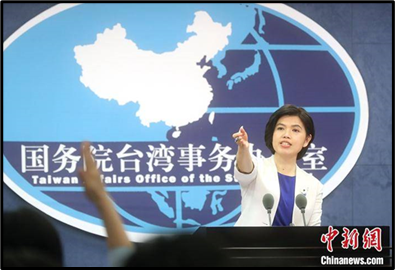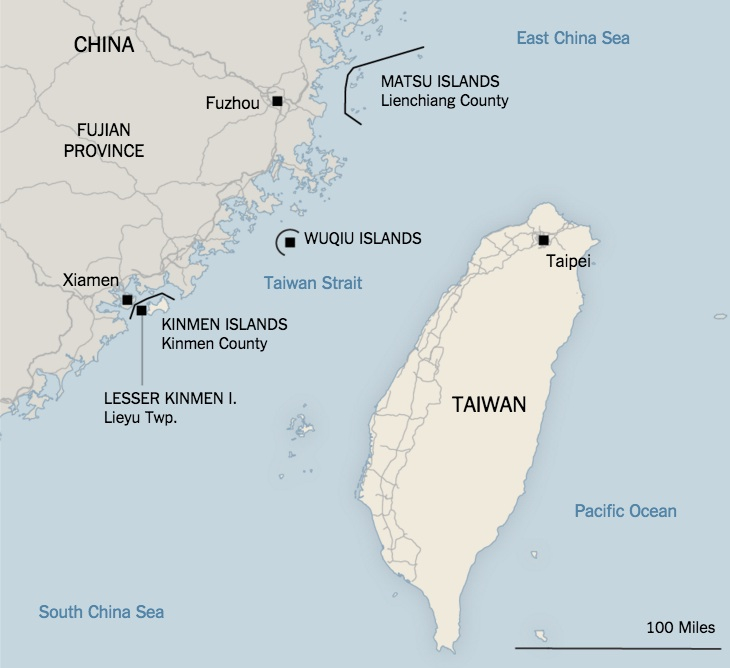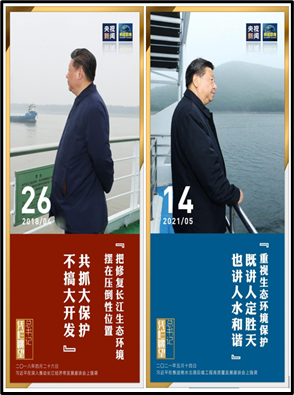
The PRC Leverages Taiwan’s Water Crisis to Promote Cross-Strait Integrated Development
Publication: China Brief Volume: 21 Issue: 13
By:

Introduction
The Republic of China (ROC or Taiwan) is emerging from its worst drought in more than half a century (Focus Taiwan, June 2). Following the annual plenary sessions of the People’s Republic of China’s (PRC or China) National People’s Congress (NPC) and the Chinese People’s Political Consultative Congress (CPPCC), which concluded in early March and are commonly referred to as the “Two Sessions,” Chinese officials and party-state media outlets notably ramped up criticism of the Taiwan government’s handling of the drought (Taiwan Affairs Office, March 31). They pointed to the PRC’s current provisioning of water to ROC-controlled islands and to its plans for other major cross-Strait infrastructure projects as evidence that Taiwan’s future development is inherently dependent on China. Such commentary has brought into sharp relief the political motives that underlie China’s designs for “cross-Strait integrated development” [两岸融合发展, liangan ronghe fazhan] (Xinhua, March 5).
Background
The PRC has long promoted increasing economic ties with the ROC in aid of broader unification goals. Historically, it has found strong support for economic development projects in the ROC-controlled offshore island groups of Kinmen (金门, Jinmen) and Matsu (马祖, Mazu) (Commonwealth Magazine, December 17, 2019; Taipei Times, July 29, 2012; Taipei Times, July 6, 2019), which were the first ROC territories to establish limited postal, transportation and trade links with China in the 2000s—the Three Mini-Links (小三通, xiao san tong). County magistrates in Kinmen and Matsu have also supported establishing water, electricity, natural gas and bridge links—the “New Four Links” (新四通, xin si tong) or “Four Mini-Links” (小四通, xiao si tong)—with China (China Brief, August 31, 2020; China News, February 13, 2019).

In August 2018, the PRC’s Fujian Province began supplying fresh water to Kinmen via an undersea pipeline (Xinhua, August 5, 2018). Kinmen aims to limit the proportion of water it derives from China to 30 percent of its total annual consumption, but Chinese media claimed that China met 68 percent of Kinmen’s water needs in March 2021 (Taipei Times, July 29, 2018; Guancha.cn, April 9). Although a water diversification plan approved by Taiwan’s Executive Yuan in 2013 was supposed to improve Kinmen’s local water resources to fulfill at least 75 percent of the territory’s water needs by 2031, a 2020 study by the Executive Yuan’s Economic Bureau found that Kinmen is set to miss that target (ROC Executive Yuan, September 3, 2020).
A little over a year after Fujian commenced operation of a pipeline to Kinmen (financed mostly by the ROC), the province also started pumping up to 500 tons of fresh water per hour to a passenger terminal in Huangqi Town, Lianjiang County. Ships can quickly ferry this supply to the Matsu islands (Fjsen.com, December 27, 2019). With a population approximately ten times smaller than Kinmen’s, Matsu has mostly been able to meet its water needs through investments in small reservoirs, desalination plants and limited shipments of fresh water from Fujian (ROC National Development Council, June 2020; United Daily News, November 4, 2020). But Dongju, the only Matsu island that does not have a desalination plant, has notably had to rely on ROC military vessels for water supplies since March 2021 (CNA, March 12; United Daily News, June 14). China has stated its plans to eventually pump water directly to Matsu by way of a pipeline extending from Lianjiang County (United Daily News, November 4, 2020).
In recent years, the Democratic Progress Party (DPP) government in Taipei has reasserted its authority over cross-Strait interactions that might impact Taiwan’s sovereignty (Mainland Affairs Council, May 31, 2019; China Brief, August 31, 2020). These moves have led Beijing to accuse the DPP of obstructing Taiwan’s development and what Beijing maintains is a historical trend toward greater cross-Strait economic and social integration that will ultimately lead to unification (Xinhua, May 20, 2020; Taiwan Affairs Office, January 1).
As Taiwan’s Water Level Falls, Beijing’s Political Motives Rise to the Surface
When Kinmen suffered a serious drought in 1996, Chen Guoliang, head of the Fujian Water Conservancy and Water and Electricity Department, offered to build water pipelines from coastal Fujian to Kinmen and Matsu. Chen insisted at the time that there was no political motive behind the proposed water projects (UPI, June 24, 1996).
Nevertheless, during another severe drought in 2002 that impacted all ROC territories, Chinese officials and party-state media outlets used the opportunity to disparage the DPP administration in Taipei, which was reluctant to let Kinmen and Matsu purchase water from the PRC, and to promote the development of direct postal, transportation and trade links between China and Taiwan—the Three Links (三通, san tong) (Xinhua, May 21, 2002; China News, April 30, 2002).[1]
Taipei permitted Matsu to purchase a single boat-load of water from Fujian in May 2002. But Tsai Ing-wen, then head of the ROC’s Mainland Affairs Council and now president of the ROC, stressed that the purchase was an experiment. She said that Taiwan needed to take into account the state of cross-Strait relations and security concerns before purchasing more water from the PRC (Kinmen Daily, April 25, 2002; Liberty Times, April 25, 2002; Kinmen Daily, May 8, 2002). Some in the ROC remained concerned about the political and national security implications of the projects when Taipei agreed to move forward with a pipeline to Kinmen in 2013 (China Post, March 23, 2013; Taipei Times, September 4, 2013).
Chinese media outlets have tracked the recent water crisis—which affected the main island of Taiwan more severely than the offshore islands—since last fall (People’s Daily, November 3, 2020). But their coverage intensified and became highly politicized amid the PRC’s annual legislative Two Sessions (March 3-11). Party-state media picked up on a debate about the human and environmental factors behind the water shortage within Taiwan (Xinhua, March 8). A March 9 editorial in the nationalist tabloid Global Times claimed that the drought’s impact on Taiwan’s semiconductor manufacturing industry reflected the “severe lack of economic independence of the island.” It also highlighted that Kinmen, in contrast to the island of Taiwan, had overcome its long-running water issues by relying on China (Global Times, March 9). The next day, Zhang Zhijun (张志军), head of China’s Association for Relations Across the Taiwan Straits and a former Minister of the PRC State Council Taiwan Affairs Office (国务院台湾事务办公室, Guowuyuan Taiwan Shiwu Bangongshi), called for the realization of the Four Mini-Links and the building up of Fujian as a demonstration area for cross-Strait integrated development (China News, March 10).
On March 29, Zhu Fenglian (朱凤莲), a spokeswoman for the PRC Taiwan Affairs Office, accused DPP officials of defaming China by commenting on reports of systematic human rights abuses against China’s Uyghur ethnic minority and advised them to instead focus more on the hardships of the Taiwan people, such as the water shortage and ongoing drought (Xinhua, March 29). Two days later, Zhu mentioned the drought again in reply to a question about Beijing’s response to recent proposals by Taipei. She noted that Kinmen had benefitted from its new water pipeline and that China had accepted its request to increase the water supply during the current drought. Zhu asserted that only when cross-Strait relations were good would the Taiwanese people’s well-being improve, and called for “compatriots” (同胞, tongbao) on both sides of the Taiwan Strait to work together to “remove obstacles” (排除障碍, paichu zhangai) and to promote their interests and well-being (Taiwan Affairs Office, March 31).
Knock-On Media Blitz
After the Taiwan water crisis was elevated as a political topic by both the government and media in March, a number of party-state media outlets and commentators, including some with ties to organizations affiliated with Chinese united front work, continued to heavily promote Beijing’s narrative about Taiwan’s water crisis.[2] This narrative broadly consists of four main themes: 1) the DPP bears responsibility for Taiwan’s water shortage; 2) China’s provision of water to Kinmen demonstrates an inevitable trend towards greater cross-Strait integrated development; 3) the DPP is trying to obstruct cross-Strait integrated development, hurting the people of Taiwan; and 4) people in Taiwan and China need to push ahead with integrated development, especially the Four Mini-Links (Taiwan Affairs Office, March 31; China News, April 14).[3]
Chen Lili (陈丽丽), executive director of the Minnan Normal University Cross-Strait Family Research Institute , a Fujian-based think tank that contributes to Taiwan-related united front work, touched upon all four narrative themes in an April interview with Chinese state news agency Xinhua. She also argued that water is but one of Taiwan’s deficiencies, adding that the island also lacks electricity, people, professional talent, labor and land; this analysis is similar to what ROC industry associations and officials have called Taiwan’s “Five Shortages,” i.e., water, electricity, labor, professional talent and land (Xinhua, April 13; China Daily, April 15; The News Lens, April 14, 2018).
Contributors to the “Sun Moon Talk” (日月谈, Ri Yue Tan) column in the overseas edition of People’s Daily which focuses on Taiwan affairs—have regularly blamed the DPP for mismanaging Taiwan’s water resources and blocking cross-Strait exchanges and development projects (Haiwainet.cn, April 22; People’s Daily, April 30; Haiwainet.cn, May 10).

Taiwan’s water problems eased somewhat in May with the arrival of the rainy season (Straits Times, June 7). A deadly train accident in April, major power outages and a surge in COVID-19 cases also became fresh fodder for Chinese news media to criticize the DPP’s governance ability and argue that Taiwan’s development depends on China (Ta Kung Pao, May 27; Huaxia.com, May 19). Chinese media outlets have continued to incorporate the water issue into their attacks against the DPP (Voice of the Strait, May 30; Taihainet.com, June 1). But by early June, their main focus was on Taiwan’s ban of Chinese-made vaccines (Global Times, June 11).
Conclusion
The Chinese leadership’s decision to once again exploit a drought in Taiwan to attack the DPP and promote deeper cross-Strait integration has likely confirmed the suspicions of Taipei, already wary that Beijing would use the Four Mini-Links to undermine Taiwan’s sovereignty (ROC Mainland Affairs Council, June 21, 2019). Taipei has criticized Beijing for its use of united front tactics related to the Kinmen water project even before the recent drought (ROC Mainland Affairs Council, August 5, 2018).
Beijing’s targeting of the DPP appears to have resonated with some of the party’s domestic political rivals. On May 19, Johnny Chiang, chairman of the KMT, remarked that the fifth anniversary of President Tsai Ing-wen’s DPP administration the next day would be notable for Taiwan’s “lack of water, lack of electricity and lack of vaccines” (缺水,缺电,缺疫苗, queshui, quedian, quebingmiao) (Central News Agency, May 19).
Commentators in Kinmen and Matsu who believe that engagement with China will benefit their territories have been receptive to Beijing’s calls to remove barriers to cross-Strait social and economic engagement (Kinmen Daily News, March 6; Fjsen.com, March 31). But even in the offshore islands, which regularly vote for pro-engagement KMT politicians, support for increasing economic ties does not translate to support for becoming politically closer to Beijing (ROC Mainland Affairs Council, October 2020). Many of the major cross-Strait development projects that Beijing promotes, such as the Four Mini-Links, are targeted at real, acknowledged development challenges facing Taiwan (The News Lens, April 14, 2018). In some cases, such as the offshore water projects, China is uniquely positioned to help meet these challenges due to geographical or other factors. But, as demonstrated by its messaging on the recent water crisis, Beijing also leverages these projects as proof of its performance legitimacy and evidence that Taiwan is inherently dependent on China for essential resources and economic growth.
Kristian McGuire is an independent, Washington D.C.-based research analyst and non-resident senior fellow at Taiwan Security Research. His main research interests include U.S.–Taiwan relations, cross-strait relations, and East Asian regional security. His work has appeared in The Diplomat, Newsweek, The Interpreter, Asia Times, E-International Relations, and TSR Weekly Report. You can reach him at kristianmcguire@gmail.com and follow him on Twitter @KrisAMcGuire.
Notes
[1]Chinese news coverage of the 2002 drought sometimes amplified the voices of Taipei’s domestic critics (China News, May 10,2002). One Chinese state media outlet reported on Lien Chan (连战), the chairman of Taiwan’s main opposition party the Kuomintang (KMT), criticizing the DPP administration for its supposed shortcomings in preparing for and managing the drought (China News, April 24, 2002).
[2] The CCP’s united front work broadly speaking can be defined as its efforts to influence and leverage non-party institutions both at home and abroad in order to serve the party’s goals. Following a recent reorganization of the CCP United Front Work Department (UFWD), the CCP has increased its united front work targeting overseas Chinese and religious groups, in addition to its longstanding historic focuses on sensitive peripheral populations in Tibet, Xinjiang, Hong Kong/Macao, and Taiwan. For more on the UFWD’s recent reorganization, see China Brief, May 19, 2019.
[3] For more examples, see: “Taiwan’s Water Shortage Stems from the DPP Administration’s ‘Lack of Moral’ Governance” ([台湾缺水源于民进党当局“缺德”的施政], Taiwan Que Shui Yuanyu Minjindang Dangju ‘Que De” De Shizheng, cross-posted to CCTV.com, April 11; Global Times, April 11; China News, April 12; People’s Daily, April 13; “Fujian Jin River Increases Water Supply to Kinmen ‘Quenches Thirst’ Kinmen Compatriots Hope Cross-Strait ‘New Four Links’ Soon Realized” ([福建晋江加大供水量为金门“解渴” 金胞盼两岸“新四通”早日实现], Fujian Jinjiang Jiada Gong Shui Liang Wei ‘Jieke’ Jinbao Pan Liangan ‘Xin Si Tong’ Zaori Shixian), published on a variety of national and regional Chinese party-state media websites, including China News, April 15; Fjsen.com, April 15; Wen Wei Po, April 16; Taiwan.cn, April 16.
The head of the united front-linked Kinmen Compatriots Association of Fujian Province (福建省金门同胞联谊会, Fujian Sheng Jinmen Tongbao Lianyihui), Chen Dubin (陈笃彬), has also argued that the Kinmen water pipeline’s success proves that Kinmen and Matsu should realize the Four Mini-Links (Fjsen.com, March 31; China News, April 15).




